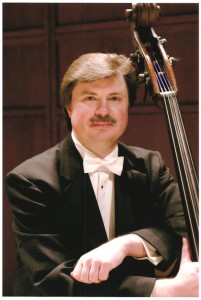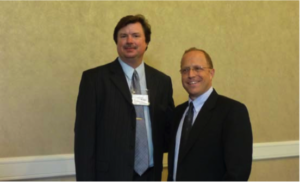
Photo credit: Michael Zirkle
With the daily onslaught of dire economic news emanating from Wall Street and Pennsylvania Avenue, all Americans find themselves concerned for the future. Symphonic musicians confront these economic issues on an ongoing basis, and it is understandable that at this moment, musicians might feel even greater consternation about the future of their chosen profession. After all, we hear negative prognostications even in the best of times, and we often face a misinformed attitude that would hold that (as Norfolk’s Virginian-Pilot wrote earlier this year), “In lean times, slashing money for the arts is the right call.”
The stronger argument, however, is that the arts play a crucial role in America’s national and local economies. The facts are well established, and have been discussed in these pages frequently in the past few years. The non-profit arts and culture industry in America accounts for over $166 billion in economic activity every year and provides over 5.7 million jobs. Every dollar that government invests in the arts returns seven dollars to the community.
ICSOM has long sought out partners that could help us spread the message that donating to the arts is not just a gift, it is a tangible investment in the communities where our citizens live, our children learn, and our companies do business. At this time of economic uncertainty, it is more important than ever to invest in the arts so that our cultural institutions can fulfill their potential to strengthen the economic health of our cities.
At the 2007 ICSOM Conference in Minneapolis, the delegates passed a resolution regarding the establishment of a national campaign to increase the public’s awareness and interest in classical music. Over the past few years, we have discussed such a campaign with many entities, but we were never successful in generating interest. While the cost of such an endeavor has frequently been cited as insurmountable, it is also true that negativity is so ingrained in our culture that not everyone in our field shares ICSOM’s desire to spread a positive message about our future.
I found the lack of interest in pursuing such a national arts advocacy campaign to be very frustrating and disheartening. After all, many industries have elevated their profile quite successfully by understanding the media in a richer way. The slogan “pork…the other white meat” is now part of the national consciousness. While those of us from the South might find it surprising that pork needs promoting, apparently it does. Nationally, the campaign to promote the business of pork producers was a huge success and a great investment. Other businesses have also recognized this need (“The Coffee Achievers”, “Got Milk?”, etc.)
The orchestral industry has long seemed behind the times when it comes to understanding the media. The field allows a negative spin to dominate, sometimes through reports commissioned from within. Managers constantly express a desire to produce media for less compensation, yet social networking websites that offer free access to a desired demographic are under-utilized by all but a handful of our orchestras.
One day about 18 months ago, I was reading a national news magazine when I saw a full-page ad with the caption: “Art. Ask for More.” It was a clever and eye-catching ad promoting the need for arts education in schools. This was a very exciting discovery for me. Here, in a prominent publication, was an example of a media savvy national advocacy campaign. I saw that it was produced by Americans for the Arts, and I immediately sought them out for more information.

Keynote speaker Randy Cohen (right) and ICSOM Chairperson Bruce Ridge at the ICSOM Conference in San Francisco
Photo credit: Laura Ross
Americans for the Arts (AFTA) is the nation’s leading nonprofit organization for advancing the arts in America. With 45 years of service, AFTA is dedicated to representing and serving local communities and creating opportunities for every American to participate in and appreciate all forms of the arts.
We believe that we have found the partner we need to spread the message that the arts are crucial to the growth of our communities. In fact, our new friends are the ones responsible for undertaking much of the research that has revealed the facts that the arts are an economically sound investment. The AFTA study, Arts and Economic Prosperity III, was released in May of 2007. Here at last is an organization dedicated to the cause of arts education, dedicated to promoting the value of the arts in our society, and astute enough to understand the need to work within the political framework to accomplish their goals.
At this year’s ICSOM Conference in San Francisco, we were pleased to welcome Mr. Randy Cohen, Vice President of Policy and Research for AFTA. Mr. Cohen is responsible for much of the great research that went in to producing Arts and Economic Prosperity III. Mr. Cohen entertained and inspired the delegates by citing indisputable facts that demonstrated the value of the arts in every city across America.
In this edition of Senza Sordino, Mr. Cohen has written a fascinating article that speaks to all of the issues of concern that symphonic musicians face in this economy, and how the arts strengthen education and our nation’s economy. It is a message that AFTA is working hard to spread, and they continue to develop their national advocacy campaign through new radio and television ads, some of which can be found at www.AmericansForTheArts.org/public_awareness.
The musicians of ICSOM need the Americans for the Arts, but AFTA also needs us. We encourage all of our members to visit the website for the Americans for the Arts at www.artsusa.org or at www.AmericansForTheArts.org.
As part of our exciting new relationship with AFTA, we will soon be able to provide free membership in AFTA’s “Arts Action Fund”. As described on the AFTA website, “Members of the Arts Action Fund want the arts to be within the grasp of all Americans. Your membership helps to advance the arts both locally and nationally by supporting pro-arts candidates and giving the arts a voice.”
In the coming weeks, you will be receiving information from ICSOM on how you might join the AFTA’s Arts Action Fund. We urge you all to consider joining.
We have long recognized that for the arts to survive and flourish, musicians must be activists as well as performers. The current climate of economic distress and negativity requires a renewed activism on the part of every artist.
Throughout the years, ICSOM has been one of the most active and successful advocacy groups around. Now is the time for ICSOM to take the next step and collaborate with a national, non-partisan organization that astutely understands how to use the media and the political system to advocate for the future of the arts in America. We are all excited at the prospect of this relationship. Please speak with your ICSOM delegate and ask for a report on the presentation that Mr. Cohen made at the most recent conference on AFTA.
There is no doubt that this is a critical time for the economy of the United States and the world. There is also no doubt that the arts can play a crucial role in the economic recovery that lies ahead. This is a message that our boards, our managements, and our communities need to hear. Let’s get the word out by working with our new friends and partners at the Americans for the Arts.





